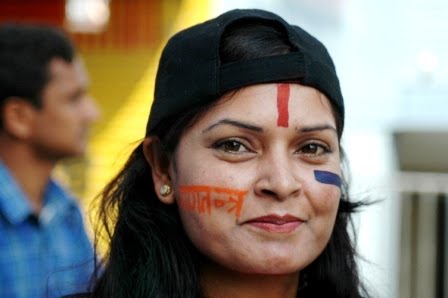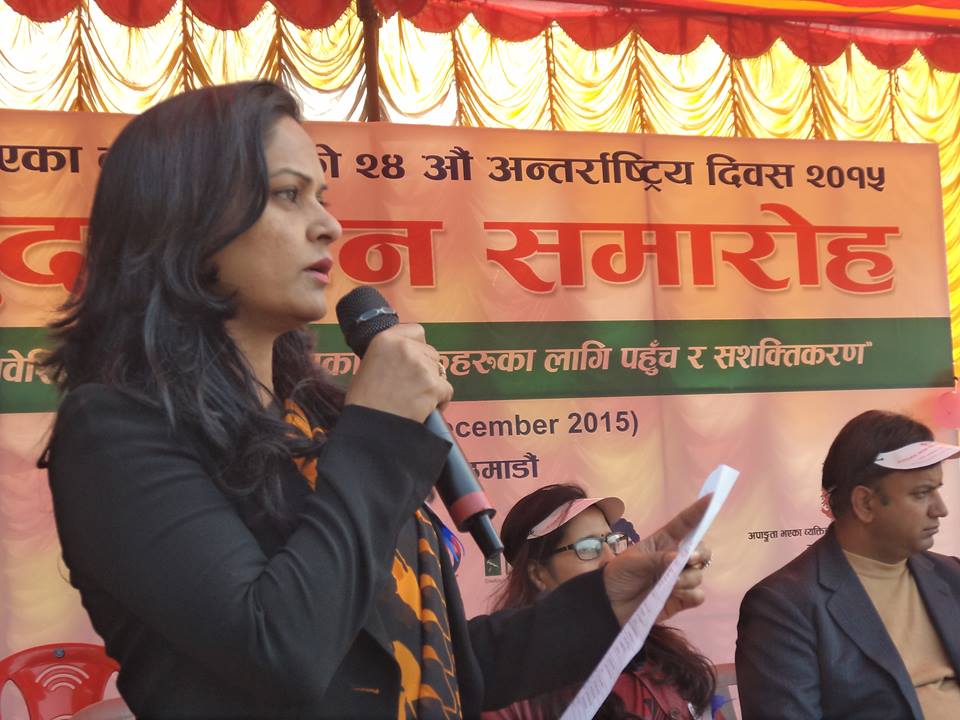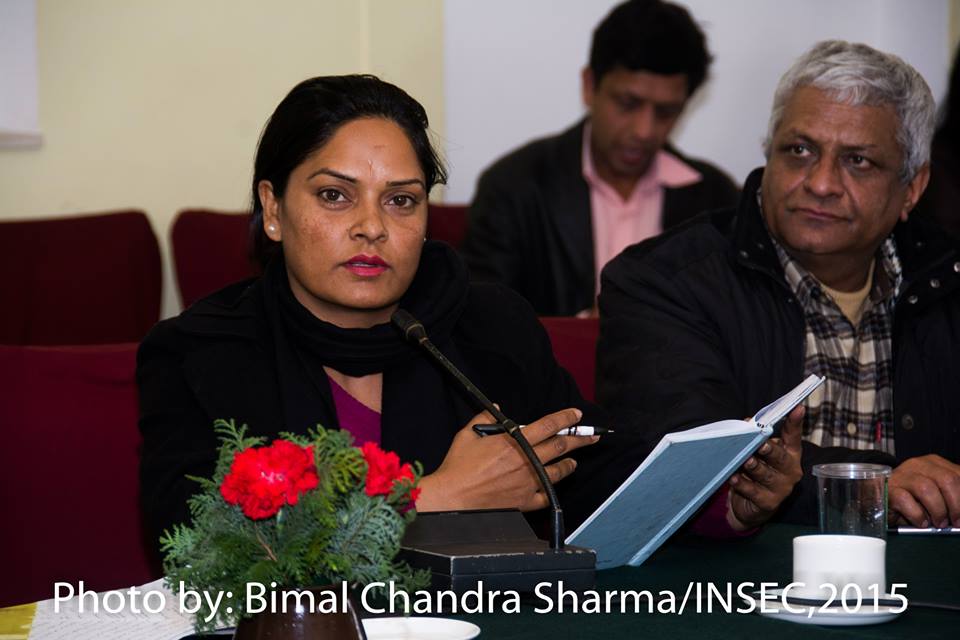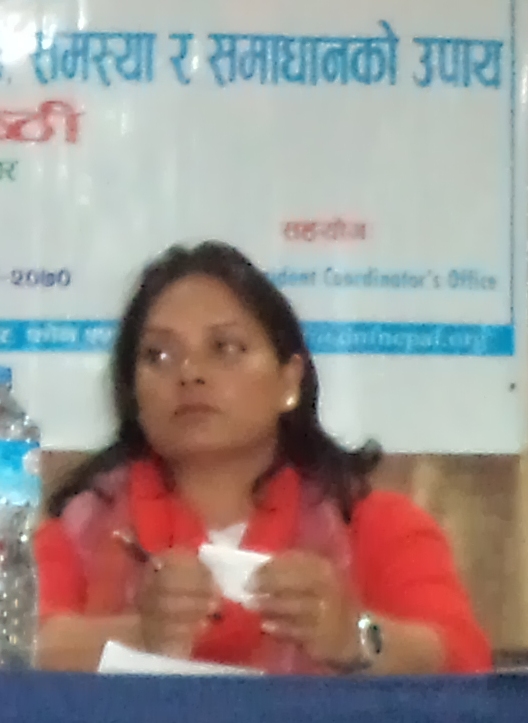People with Disabilities in Nepal – an Interview with NFDN
By Milena Rampoldi and Denise Nanni. In the following our
interview with Tika of the National Federation of the Disabled Nepal (NFDN). We
talked about the problems and the
discrimination people with disabilities face in Nepal, and about how the
organisation is engaged to support people, and to change the prejudice of the
society.
interview with Tika of the National Federation of the Disabled Nepal (NFDN). We
talked about the problems and the
discrimination people with disabilities face in Nepal, and about how the
organisation is engaged to support people, and to change the prejudice of the
society.

What are the main difficulties that people with
disabilities face in Nepal?
disabilities face in Nepal?
There still persist the attitude/view of charitable and
welfare based thinking along with traditional norms and practices that are
prevailing in the society, putting people with disabilities (PWDs) in a double
discriminatory and marginalized situation. It’s a challenge for PWDs and others
alike, to come out of this mind frame and move into a perspective that PWDs if
provided opportunities and support are capable to live an independent life.
Political instability, lack of political will/ commitment by policy makers,
poor implementation of existing policies/laws in line with UNCRPD, inadequate
/unsecured budget are some of the structural challenges on part of the
government. However insecurity of being a PWDS, prevailing discriminatory laws,
financial limitations, lack of disabled friendly infrastructure and lack of
awareness among PWDs and others alike still remain as challenges.
welfare based thinking along with traditional norms and practices that are
prevailing in the society, putting people with disabilities (PWDs) in a double
discriminatory and marginalized situation. It’s a challenge for PWDs and others
alike, to come out of this mind frame and move into a perspective that PWDs if
provided opportunities and support are capable to live an independent life.
Political instability, lack of political will/ commitment by policy makers,
poor implementation of existing policies/laws in line with UNCRPD, inadequate
/unsecured budget are some of the structural challenges on part of the
government. However insecurity of being a PWDS, prevailing discriminatory laws,
financial limitations, lack of disabled friendly infrastructure and lack of
awareness among PWDs and others alike still remain as challenges.
Moreover, with in the disabilities women with disabilities
are more backward & marginalized such as being women, disabled & socio culture
barriers they are often restricted in their movement,
imposed by their families or at times self imposed, for fear of sexual assault
and harassment due to their increased vulnerability. This is directly reflected
in WWDs falling behind in every other perspective such as education,
employment, access to health services, participation in decision-making bodies
etc.
are more backward & marginalized such as being women, disabled & socio culture
barriers they are often restricted in their movement,
imposed by their families or at times self imposed, for fear of sexual assault
and harassment due to their increased vulnerability. This is directly reflected
in WWDs falling behind in every other perspective such as education,
employment, access to health services, participation in decision-making bodies
etc.
Women with disabilities are
suffered from various health problems due to their asexual image. Negative
attitude & gender stereotypes toward Women with disabilities in the context
of marriage & settle family life like they have no sexual desire, looking
ugly, unable to give birth healthy baby & unable to barer baby, give birth
disabled baby.
suffered from various health problems due to their asexual image. Negative
attitude & gender stereotypes toward Women with disabilities in the context
of marriage & settle family life like they have no sexual desire, looking
ugly, unable to give birth healthy baby & unable to barer baby, give birth
disabled baby.
Sexual & Reproductive
Health only link with marriage, but people don’t want to get marriage with her
due to her disability, cultural and traditional believe so deprive fully
enjoying their Sexual & Reproductive Health Rights.
Health only link with marriage, but people don’t want to get marriage with her
due to her disability, cultural and traditional believe so deprive fully
enjoying their Sexual & Reproductive Health Rights.

Do you think that prejudices about disability still have
a strong influence on the social inclusion?
a strong influence on the social inclusion?
Yes, interms of inclusion matters disability should be
cross cutting issues so it has to focused to as an intersectionality with in
the women rights, dalit rights, indiginious rights, sexual minorits so on. The
Nepal government has no specific body or mechanism to consider issues of
persons with disabilities. The Ministry of Women, Children and Social Welfare
is considered to be the line ministry for all legislative purposes relating to
the PWDs. There still people have a thinking like
disability is inability, they canot contribute to the family & society so
need to rehabilited them through the social security allounce & need put in
the rehabilitation center in case of sever disability. Although, Nepals new
constitutions has provision to all citizen should have equal rights with
inclusion but in practice not full inclusion of the people with disability they
just treated as a tokenism. The disbaled peoples issues are also not been able to see from a
perspective of social justice and they are considered as uncapable to perform
any activities. PWDs are also deprived from lack of proper communiction and
rights to information. All these problems can be to some extent mitigated
through increasing awareness among people to be disable friendly and
provide their support and empathy to the
PWDs.
Regarding the legal access and legal capacity; Nepal
Government doesn’t consider the helping required to confess each problem. So
legal revisions required.
Laws are also discriminatory towards women with disabilities (Eg Civil
Code 2020 BS Section 9 of the Chapter entitles a man to get enter into a second
marriage if his wife has been rendered blind, physically or mentally disabled).
Government doesn’t consider the helping required to confess each problem. So
legal revisions required.
Laws are also discriminatory towards women with disabilities (Eg Civil
Code 2020 BS Section 9 of the Chapter entitles a man to get enter into a second
marriage if his wife has been rendered blind, physically or mentally disabled).
Similarly, the Nepal state is
also not being able to full address the issues of PWDs. Lack of reliable
statistics or disaggregated data is one of primary problems that serve to
enhance discrimination against PWDs. Such disparity results in low visibility
of PWDs and their issues in policy-making initiatives and particularly in
service delivery institutes that may cater to their needs.
also not being able to full address the issues of PWDs. Lack of reliable
statistics or disaggregated data is one of primary problems that serve to
enhance discrimination against PWDs. Such disparity results in low visibility
of PWDs and their issues in policy-making initiatives and particularly in
service delivery institutes that may cater to their needs.

How do you address the problem of raising awareness about
disability issues?
disability issues?
National
Federation of the Disabled Nepal (NFDN) has adopted advocacy, awareness,
capacity building and networking & collaboration as the key strategies to
achieve its long term development goal. NFDN was established with the vision of
empowering person with disability who is educated, socially secure, and
economically productive, politically awareness, and happily living with full
realization of human right and dignity in an inclusive and a barrier free
society. Its overall goal is to increase capacity of all Disabled Peoples
Organization’s (DPOs) in management, leadership, advocacy and local resource
mobilization within an active and effective network of NFDN to fight for the
right and dignity of persons with disability.
Federation of the Disabled Nepal (NFDN) has adopted advocacy, awareness,
capacity building and networking & collaboration as the key strategies to
achieve its long term development goal. NFDN was established with the vision of
empowering person with disability who is educated, socially secure, and
economically productive, politically awareness, and happily living with full
realization of human right and dignity in an inclusive and a barrier free
society. Its overall goal is to increase capacity of all Disabled Peoples
Organization’s (DPOs) in management, leadership, advocacy and local resource
mobilization within an active and effective network of NFDN to fight for the
right and dignity of persons with disability.
The DPOs on the other
hand has nationwide network and trying its best to lobby and advocate ensuring
PWDs rights. There are around 335 DPOs operating throughout the country, and
National Federation of Disabled Nepal (NFDN) is the umbrella organization.
Besides there are also impairment specific national networks such as National
Federation of Deaf and Hard of Hearing, intellectual parents federation, Blind
network & women with disabilities networks. There are some good examples of
NFDNs lobbying and advocacy work such as current civil service act has
provisioned the proportionate inclusion of the PWDs in the recruitment, PWDs
get 50% discount on air fares, government amended the classification of
disability making this disable friendly, ensure the political rights of people
with disabilities in the new constitution etc.
hand has nationwide network and trying its best to lobby and advocate ensuring
PWDs rights. There are around 335 DPOs operating throughout the country, and
National Federation of Disabled Nepal (NFDN) is the umbrella organization.
Besides there are also impairment specific national networks such as National
Federation of Deaf and Hard of Hearing, intellectual parents federation, Blind
network & women with disabilities networks. There are some good examples of
NFDNs lobbying and advocacy work such as current civil service act has
provisioned the proportionate inclusion of the PWDs in the recruitment, PWDs
get 50% discount on air fares, government amended the classification of
disability making this disable friendly, ensure the political rights of people
with disabilities in the new constitution etc.
Similarly, through
the media mobilization such as FM Radio, news paper, television & online
media in national & local level for
publishing positive news, PSA, radio drama, success story etc.
the media mobilization such as FM Radio, news paper, television & online
media in national & local level for
publishing positive news, PSA, radio drama, success story etc.

What are the main features and purposes of your capacity
building program?
building program?
In order to attain
these, the NFDN has strengthened both in an individually and organizationally
through networking in National level to grass roots level & providing
various training to people with disabilities as an individual level. Along with
this capacity building of Member Organization on advocacy, leadership and
organizational management & capacity building of government agencies and
other stakeholders on disability inclusion.
these, the NFDN has strengthened both in an individually and organizationally
through networking in National level to grass roots level & providing
various training to people with disabilities as an individual level. Along with
this capacity building of Member Organization on advocacy, leadership and
organizational management & capacity building of government agencies and
other stakeholders on disability inclusion.
Do you cooperate with local authorities and institutions?
If yes, how?
If yes, how?
Yes, NFDN’s main goal is ensured barrier
free inclusive and accessible society for all including persons with
disabilities in all aspect of social life and they have decisive role in
political, civic and cultural life with their dignity fully protected and
respected. One of the strategic objectives of NFDN is to enhance the capacity
of local DPOs, disability actors and Self-help groups to execute the advocacy
initiatives at local level. Further NFDN has been building up the networking
with likeminded organizations and to develop the synergy with different stake
holders for promoting the rights and benefits of the persons with disabilities
in Nepal.
free inclusive and accessible society for all including persons with
disabilities in all aspect of social life and they have decisive role in
political, civic and cultural life with their dignity fully protected and
respected. One of the strategic objectives of NFDN is to enhance the capacity
of local DPOs, disability actors and Self-help groups to execute the advocacy
initiatives at local level. Further NFDN has been building up the networking
with likeminded organizations and to develop the synergy with different stake
holders for promoting the rights and benefits of the persons with disabilities
in Nepal.
NFDN has been in
partnership with different national and international Organizations (Donors)
those who are working in National to local level as well as collaborating
partner of Ministry of women children and Social Welfare, the government of
Nepal. Further NFDN has demonstrated capacity to execute different level of
advocacy initiatives through its regional, districts and community level
affiliated member organizations & closely working with the local government
authority for increasing access to local resource/budget which already has
allocated inclusive budget & program by the government for empowering the
people with disabilities & strengthen Disabled People Organizations. Likewise
in strong collaboration with women children office in district for distributing
disability ID card, disability allowances & assistive devices etc. also
working with police office for aiming to eliminate the violence against women
& girls in local level.
partnership with different national and international Organizations (Donors)
those who are working in National to local level as well as collaborating
partner of Ministry of women children and Social Welfare, the government of
Nepal. Further NFDN has demonstrated capacity to execute different level of
advocacy initiatives through its regional, districts and community level
affiliated member organizations & closely working with the local government
authority for increasing access to local resource/budget which already has
allocated inclusive budget & program by the government for empowering the
people with disabilities & strengthen Disabled People Organizations. Likewise
in strong collaboration with women children office in district for distributing
disability ID card, disability allowances & assistive devices etc. also
working with police office for aiming to eliminate the violence against women
& girls in local level.

Nepal is a
ratifying country of United Nations Convention on the Rights of Persons with Disabilities
so it needs to be domestication by the government through the formation &
amendment legal framework. Based on the new constitution more than 150 laws are being revised and amended and they are taking
feedback from the general public. We have also good opportunity to give feedback
to make sure disabilities issues with focus to People with disabilities issues
are addressed in this revised law.
ratifying country of United Nations Convention on the Rights of Persons with Disabilities
so it needs to be domestication by the government through the formation &
amendment legal framework. Based on the new constitution more than 150 laws are being revised and amended and they are taking
feedback from the general public. We have also good opportunity to give feedback
to make sure disabilities issues with focus to People with disabilities issues
are addressed in this revised law.
Now, NFDN is taking lead to prepare
shadow report of CRPD, a main CRPD shadow report writing committee consisting
of DPOs, NGOs, Human Rights Organizations, Women Rights Organization and Media
is formed. Shadow report will present the broader picture of situation of
people with disabilities of Nepal and will pressurize the government as well as
international community including UN to bring our programs that will ultimately
uplift the life status of men and women with disabilities including sever
disability and they will be able to enjoy all rights as others.
shadow report of CRPD, a main CRPD shadow report writing committee consisting
of DPOs, NGOs, Human Rights Organizations, Women Rights Organization and Media
is formed. Shadow report will present the broader picture of situation of
people with disabilities of Nepal and will pressurize the government as well as
international community including UN to bring our programs that will ultimately
uplift the life status of men and women with disabilities including sever
disability and they will be able to enjoy all rights as others.


